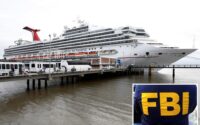Flight chaos across US could continue for a decade: report
The recent spate of flight delays and cancellations may persist for as much as a decade – due to a shortage of some 32,000 pilots, mechanics and air-traffic controllers, as well as “unrealistic scheduling” by airlines, according to an investigative report.
Transportation Secretary Pete Buttigieg told CBS News his office is investigating several airlines for what a rep called “unrealistic scheduling,” which leads to a carrier’s inability to provide the expected service to the flying public.
Experts said the trend in staffing issues suggests that the problem could get a lot worse before it gets better — and could affect travelers for another decade.
“Some of the predictions I’m hearing is that the pilot shortage won’t be resolved until 2032 or something like that,” Dean Headley, one of the data and industry experts, told CBS News.
Buttigieg’s office confirmed to CBS News that Southwest Airlines is among the companies under investigation but declined to name the others or provide a timeline for the process.
From Dec. 24 to Dec. 31, software and staffing issues forced Southwest to cancel 14,042 flights, which was 72.3% of all canceled flights nationwide, the outlet reported, citing Department of Transportation (DOT) data.
The airline, which apologized for the rash of cancellations after a massive storm, did not respond to a request for comment by CBS News.


The scheduling issues come amid an expanding lack of personnel, including about 32,000 pilots, mechanics and air-traffic controllers, according to a CBS News analysis of data from the Federal Aviation Administration, DOT and Department of Labor.
“There’s definitely gaps in places. The system is just uneven right now,” said Buttigieg, who acknowledged that the staffing woes have contributed to the surge in cancellations and delays.
Industry experts have recently warned that the summer season will be rough for travelers in part because of lingering air traffic-controller staffing issues and over-scheduling by airlines.
The FAA said it has been working to fix staffing problems in New York City and other parts of the country — and even asked airlines to cut down on their summer schedules.
“If an airline is knowingly flying an unrealistic schedule, there are going to be consequences,” Buttigieg told CBS News when asked whether he’d hold airlines accountable for not considering staffing levels.
“We have active investigations underway right now with regard to that,” he said. “We take that very seriously because when you sell a ticket to a paying customer and you make a profit off of that, you better be ready to do everything in your power to service that ticket.
“And we’re also going to hold you responsible for what happens if you can’t,” the secretary said.
“If you look at the delays, for example, that America experienced through last year in the summer 2022, a lot of that was driven by these companies not having the staff that they needed,” Buttigieg continued.
“This is not something that’s going to be worked out overnight. It took years to get this way,” he added.
Buttigieg faced the wrath of travelers during the recent holiday weekend, which was marred by chaos that hit New York metro airports the hardest due to foul weather, technical glitches and staffing shortages.
He said the bad weather – which airlines often blame for delays — was the main culprit for the snafus.
But the number of delays caused by issues within airlines’ control has spiked from 5.2% in 2018 to 7.6% in 2023 – translating to thousands of delayed flights, according to a CBS News analysis of data from FlightAware.
During the four-day stretch from June 24 to 27, 31,850 flights — a third of all flights in the US — were delayed, an increase of 25% from the same period last year, and 6,346 scheduled flights were canceled, or one in every 17, according to the news outlet’s analysis.
When compared to the same stretch in 2019, prior to the pandemic, the number of cancellations was up a whopping 374%, CBS News reported.
On Dec. 16, a bipartisan group of 34 state attorneys general wrote a letter to Buttigieg, saying his department “has yet to develop the ability to respond quickly enough to or coordinate effectively with our offices.”
They wrote that “USDOT should require airlines to advertise and sell only flights that they have adequate personnel to fly and support, and perform regular audits of airlines to ensure compliance and impose fines on airlines that do not comply,” according to CBS News.
In June 2022, Democratic Sens. Edward Markey of Massachusetts and Richard Blumenthal of Connecticut wrote letters to the CEOs of 10 airlines to demand action.
“While the industry has blamed these disruptions on unexpected weather and air traffic control issues, the data suggests the airlines themselves are at fault for many flight delays and cancellations,” they wrote.
“Airlines should have significant notice that they lack the crew to meet a certain flight schedule and, therefore, any shortages should not result in last-minute flight cancellations,” the senators added.
Airlines-4-America, the association representing seven of the country’s largest carriers, told CBS News that the airlines have “reduced their schedules to reflect current operating realities” and are “hiring aggressively to make sure they have the right people in the right place at the right time.
“US airlines recognize the importance of securing a pipeline of new employees — pilots, flight attendants, mechanics and others — and have established new pilot training programs, enhanced recruitment efforts and implemented programs to address financial hurdles,” the spokesperson added.
The aviation industry is short about 17,000 pilots, 12,800 certified mechanics and about 3,000 air-traffic controllers, according to CBS News.
There’s no doubt the staffing shortage “affects us now,” Wichita State University emeritus associate professor Headley told the outlet. “They are leaving planes on the ground because they don’t have enough people to fly them for ground crews or anything like that,” said Headley, who conducted marketing analyses on US airlines for decades at the W. Frank Barton School of Business at Wichita State.
“The airlines are doing about as much as they can [to improve staffing levels]. They can train about 1,500 to 1,800 pilots a year,” he said, adding that the industry “can’t catch up that quick.”
Meanwhile, the DOT’s Inspector General said in a recent report that in 20 of the 26 critical control towers across the US, staffing fell well below the FAA’s own 85% minimum threshold.
New York Terminal Radar Approach Control, or TRACON, Miami Tower and New York Center the staffing is critically low, according to the IG, who took the FAA to task for making “limited efforts to ensure adequate controller staffing.”
Capt. Dennis Tajer, a spokesman for the American Airlines pilots’ union, expressed concerns about the lack of air-traffic controllers.
“What I’m seeing is the system is under super pressure,” Tajer told CBS News, adding that right now, “we are sustaining that margin of safety … but eventually it’s like anything and something’s going to give.”


